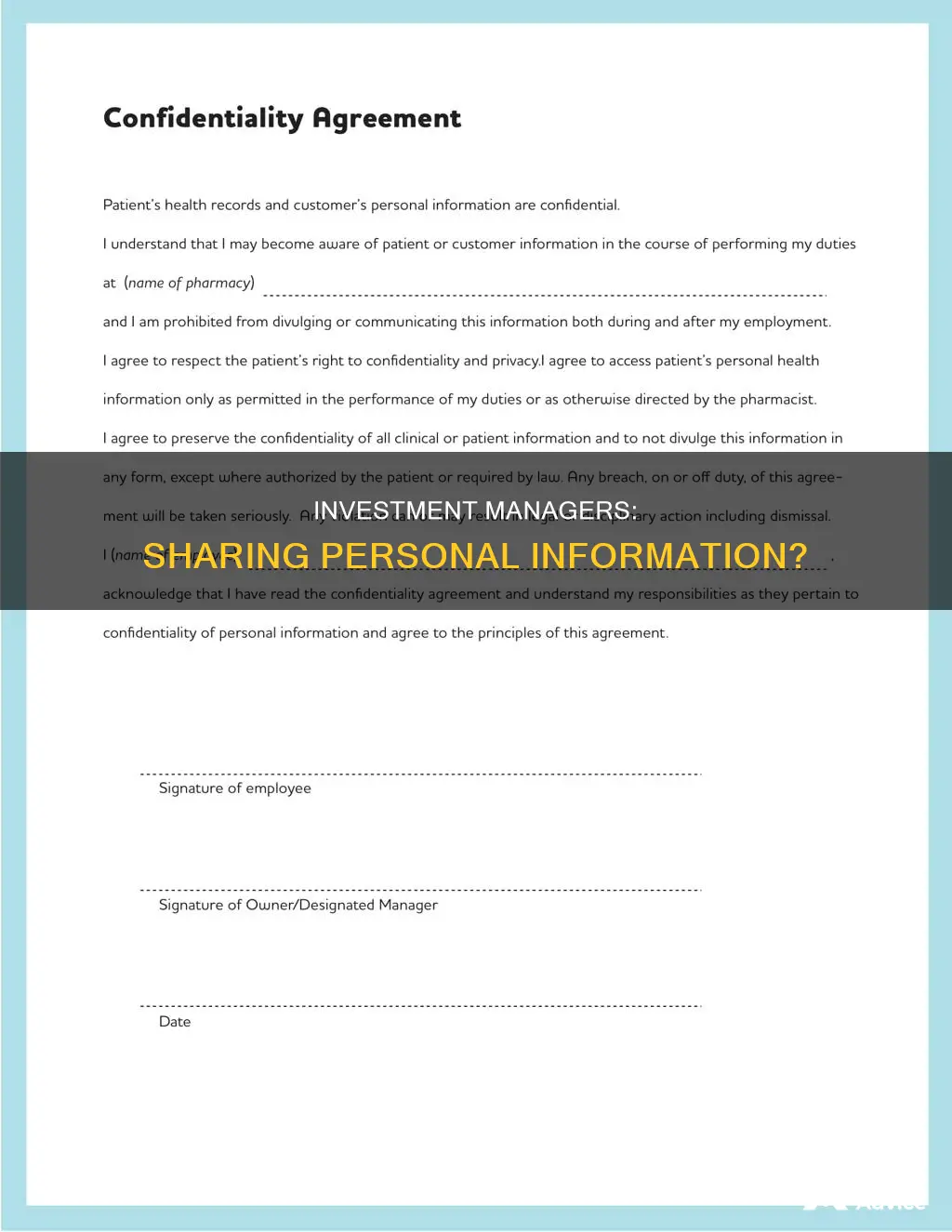
Investment managers are individuals or organisations that help clients with financial planning, investing, and managing their portfolios. They are responsible for handling their clients' financial information, such as their savings goals, risk tolerance, and financial priorities. While investment managers have access to sensitive personal and financial information, it is not clear to what extent they share this information with others. Financial companies, in general, share information for various reasons, including offering more services, introducing new products, and profiting from client data. However, there are privacy laws in place that give individuals the right to opt out of sharing their personal financial information with certain entities.
| Characteristics | Values |
|---|---|
| Investment managers' access to personal information | Investment managers have access to clients' personal information, such as their financial goals, risk tolerance, and portfolio performance. They may also have access to clients' tax and legal information if they offer financial planning services. |
| Purpose of information sharing | Investment managers use clients' personal information to make investment decisions, create financial plans, and provide advice. They may also share information with third parties for marketing or promotional purposes, with the client's consent. |
| Legal requirements | In the United States, investment managers are regulated by the Securities and Exchange Commission (SEC) and must register with the SEC or a state securities regulator. They are also subject to privacy laws and must provide clients with privacy notices explaining their information-sharing practices. |
| Client consent | Clients have the right to limit the sharing of their personal information and can opt out of certain types of information sharing. They should carefully review privacy notices and understand their rights regarding their personal data. |
| Information security | Investment managers are responsible for protecting their clients' personal and financial information. This includes implementing security measures to safeguard sensitive data and ensuring compliance with regulatory requirements. |
What You'll Learn

Investment managers and their clients
Investment managers are individuals or organisations that handle financial planning, investing, and portfolio management activities on behalf of their clients. They can be one-person offices or large firms with global offices.
Investment managers help their clients by devising strategies and executing trades within a financial portfolio. They buy and sell securities and assets, create short- or long-term investment strategies, oversee a portfolio's asset allocation, and develop a tax strategy.
To do this, investment managers need to know their clients' financial goals and attitude to risk. They need to know how much the client has to invest, how much return they want, when they will need to access their money, and how much risk they are willing to take on.
The more profit an investment manager makes for their client, the more money they make. They charge a management fee and take a percentage of the profits from the investments.
Investment managers commonly hold undergraduate degrees in business, statistics, finance, mathematics, or accounting, and many have an MBA or professional certifications such as Certified Financial Planner (CFP).
In the US, investment managers are regulated by the Securities and Exchange Commission (SEC).
Robinhood Investing and Portfolio Management: A Beginner's Guide
You may want to see also

Investment managers' responsibilities
Investment managers have a wide range of responsibilities, from creating investment strategies to overseeing portfolio and asset management.
They are responsible for managing investment portfolios on behalf of their clients, ensuring that they perform according to the client's objectives. This includes helping clients reduce risk, maximise profits, and cut losses. They identify assets to include in clients' portfolios, advise on the ideal time to buy or sell, and buy and sell assets to achieve specific investment objectives.
Investment managers also supervise a team of financial analysts and client accounts, study and analyse market trends and trading behaviour, and track the performance of investment portfolios. They enforce compliance with regulatory and legal requirements, such as anti-money laundering laws and anti-fraud protocols.
Additionally, they meet with other investment professionals to improve processes, prospect for new clients, and provide excellent customer service. They also assist clients in vetting new investment opportunities and providing advisory services.
Investment managers must possess strong analytical skills to interpret market information and make data-based decisions. They also need excellent communication skills to build trust with clients and collaborate effectively with other professionals.
Overall, investment managers have a crucial role in helping clients achieve their financial goals, maximise profits, and reduce risks associated with investments.
Trade Deficits: Savings, Investments, and the Economy's Future
You may want to see also

Investment management fees
Management fee structures are usually based on a percentage of assets under management (AUM). Fees can range from as low as 0.10% to more than 2% of AUM. The more actively managed a fund is, the higher the management fees. For example, an aggressive stock fund that turns over its portfolio several times a year in search of profit opportunities will have higher management fees than a passively-managed fund, such as an index fund. Actively-managed funds generally result in higher management fees than those that are passively managed, but they don't necessarily see better returns.
Robo-advisors, which use a computer algorithm to determine the ideal investment mix, are a low-cost alternative to traditional investment managers. They typically charge between 0.25% and 0.50% of the assets they manage.
Traditional financial advisors, who provide portfolio management and financial planning services, usually charge a fee based on a percentage of AUM, typically around 1%. For smaller accounts, this can be higher, and for larger accounts, a flat fee may be more cost-effective.
Choosing an Investment Portfolio: Strategies for Success
You may want to see also

Investment management as a career
Investment management is a lucrative career option for those interested in helping others get substantial returns on their investments, analysing risk, or helping businesses buy other businesses. It is a fascinating career that involves advising people and companies on what to do with their money. It is a creative and innovative career that involves tailoring investment portfolios to the needs, goals, and level of risk of the client.
Investment managers have a lot of career options. They can work in banks, brokerage firms, credit unions, and insurance companies. They can also choose to manage the investments of individuals or businesses. With the right education and knowledge, there is also the opportunity to join well-known financial institutions.
The career is financially rewarding, with some of the highest starting salaries in finance. In the United States, Glassdoor reports that the annual salaries for investment managers range from $51,000 to just under $172,000. The U.S. Bureau of Labor Statistics (BLS) puts investment managers in both the financial analyst and financial manager categories and reports that the median annual salary was between $83,664 and $134,180 for both positions in 2020.
The job outlook for investment management is positive, with the BLS predicting a 17% growth in employment from 2020 to 2030. This is much higher than the average for all occupations. However, competition for these roles is expected to be fierce, so a good level of education and experience is necessary.
To become an investment manager, a bachelor's degree in a field such as financial management or economics is typically required. Popular options to advance in this career include becoming a CFA Charterholder, a CAIA Charterholder, earning the FRM designation, or earning a master's degree in business management or administration.
Investment management is a challenging career that requires the ability to cope with stress and thrive in a competitive work environment. It is a career that demands passion, goal orientation, proficiency in mathematics and data analysis, and a love for solving problems.
IT Investment Portfolio: Maximizing Tech Spending
You may want to see also

The benefits of investment management
Investment management is the process of building a portfolio of stocks, bonds, and other investments based on an individual's goals. It can be done independently or with the help of an investment manager. Investment management services include elements of asset and stock selection, financial analysis, and continuous monitoring of investments. Here are some benefits of investment management:
- Maximizing Benefits: Investment management professionals aim to help investors earn maximum benefits from their investments. They discern the best investment strategies, provide financial analysis, and select suitable assets and stocks.
- Financial Security: Investment is a form of financial security for the future. By investing, individuals can aim to earn higher returns compared to traditional savings accounts, which often struggle to beat inflation. With good investment management, individuals can potentially achieve annual returns of 10% to 15% on their investments.
- Diversification: Investment management encourages diversification across different investment mediums, such as the stock market and bond market. By investing in multiple options, individuals can balance their risk exposure and potentially cover losses in one medium with profits from another.
- Professional Expertise: Investment managers are professionals who can provide valuable advice to private investors. They have the expertise to analyze financial markets, select appropriate investments, and monitor performance continuously. This can be especially beneficial for individuals who lack the time, knowledge, or confidence to manage their investments independently.
- Holistic Financial Planning: Some investment managers also offer financial planning services, providing holistic advice on topics like cash flow management, taxes, insurance, and estate planning. This comprehensive approach ensures that investment strategies are aligned with an individual's overall financial goals and risk tolerance.
- Efficiency and Cost Savings: Investment management promotes operational efficiency by aligning investment decisions with an individual's needs, goals, and risk tolerance. It helps optimize spending and identify areas where costs can be saved or eliminated. Additionally, by consolidating investment accounts, investment managers can streamline an individual's financial life, making it easier to execute a cohesive investment plan.
Why You're Not Saving and Investing: Excuses Debunked
You may want to see also
Frequently asked questions
An investment manager is an individual or organisation that handles financial planning, investing and portfolio management activities for their clients. They can be one-person offices or large firms with global offices.
Investment managers require key information from their clients, including how much the client has to invest, their desired return on investment, when they will need to access their money, and how much risk they are willing to take on.
Investment managers may share personal information with other companies for various reasons, such as offering more services or introducing new products. However, clients have the right to limit or opt out of information sharing by following the instructions provided by their financial company.
Investment managers take on the effort of creating and managing an investment portfolio on behalf of their clients. They also open up new investment opportunities that may not otherwise be available. Additionally, they handle the day-to-day buying and selling of securities and assets, transaction settlement, and performance measurement.







